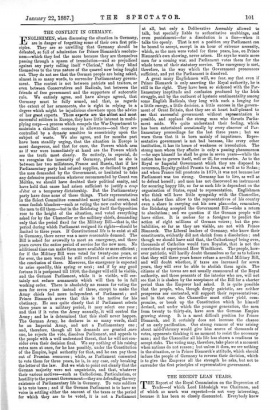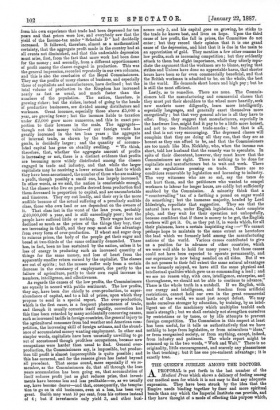THE RECENT LEAN YEARS.
THE Report of the Royal Commission on the Depression of Trade—of which Lord Iddesleigh was Chairman, and of which so much was expected—is not very interesting, because it has been so closely discounted. Everybody knew
from his own experience that trade had been depressed for ten years and that prices were low, and everybody saw that the yield of the Income-tax under" Schedule D" had decidedly increased. It followed, therefore, almost as a mathematical certainty, that the aggregate profit made in the country had at all events not diminished, and that this undeniable depression must arise, first, from the fact that more work had been done for the money ; and secondly, from a different apportionment of profit among the classes engaged in production. This was the general impression, recorded repeatedly in our own columns, and this is also the conclusion of the Royal Commissioners. They say the profits of many classes of business, and especially those of capitalists and manufacturers, have declined ; but the total volume of production in the Kingdom has increased nearly as fast as usual, and much faster than the numbers of the population. The nation, therefore, is growing richer; but the riches, instead of going to the heads of productive businesses, are divided among distributors and workmen. Great incomes, especially those above £5,000 a year, are growing fewer ; but the incomes liable to taxation under £2,000 grow more numerous, and this in exact pro- portion to their lowness in the scale. The aggregate— though not the money value—of our foreign trade has greatly increased in the ten lean years • the aggregate of internal trade, as shown by the traffic receipts for goods, is decidedly larger ; and the quantity of accumu- lated capital has gone on steadily swelling. " We think, therefore, that, whether the aggregate amount of profits is increasing or not, there is a distinct evidence that profits are becoming more widely distributed among the classes engaged in trade and industry, and that while the larger capitalists may be receiving a lower return than that to which they have been accustomed, the number of those who are making a profit, though possibly a small one, has largely increased.' In other words, as we said, the nation is comfortable enough, but the classes who live on profits derived from production find them decreased in proportion to capital, and are uncomfortable and timorous. They cry out loudly, and their cry is the more audible because of the actual suffering of a peculiarly audible class, those who own land or are dependent on the owners of it. That class lost in the worst of the lean years, probably £40,000,000 a year, and is still exceedingly poor ; but the people have suffered little or nothing. Their wages have not declined so much as the prices of the things they buy, they are increasing in thrift, and they reap most of the advantage from every form of over-production. If wheat and sugar drop to ruinous prices, the body of the people get their sugar and bread at two-thirds of the sums ordinarily demanded. There has, in fact, been no loss sustained by the nation, unless it be loss of energy in producing such an increased quantity of things for the same money, and loss of heart from the apparently smaller return earned by the capitalist. The classes are out of spirits ; but the masses suffer only from a certain decrease in the constancy of employment, due partly to the failure of agriculture, partly to their own rapid increase in numbers, intelligence, and effectiveness.
As regards the causes of the low profits, the Commissioners are equally in accord with public sentiment. The low profits, they say, have been due chiefly to over-production, to super- abundance of capital, and to a fall of prices, upon which they propose to send in a special report. The over-production, which is the first cause, is a frequent phenomenon of trade, and though it usually corrects itself rapidly, correction has this time been retarded by many accidentally concurring causes, such as increased tariffs in foreign countries, the general inj cry to the agricultural consumer from bad weather and American com- petition, the increasing skill of foreign artisans, and the abund- ance of accumulated money wanting employment. In other and simpler words, capitalists have been unusually unwilling to go out of accustomed though profitless occupations, because new occupations were harder than usual to find. General over- production, the Commissioners say, is impossible, but produc- tion till profit is almost imperceptible is quite possible ; and this has occurred, and for the reasons given has lasted beyond all precedent. That seems sound, more especially if we re- member, as the Commissioners do, that all through the lean years accumulation has been going on, that accumulation of itself reduces profit just as glut reduces price, that invest- ments have become less and less profitable—or, as we usually say, have become dearer—and that, consequently, the tempta- tion to go on in old businesses, even at a lose, has been very great. Smith may want 10 per cent, from his cottons instead of 4; but if investments only yield 3, and other busi- nesses only 5, and his capital goes on growing, he sticks to the trade he knows best, and lives on hope. Upon the third cause of low profit, the fall in prices, the Committee do not enter ; but they record their opinion that it is one grand cause of the depression, and hint that it is due in the main to an appreciation of gold. They mention a few other reasons for low profits, such as increasing competition ; but they evidently attach to them but slight importance, while they utterly repu- diate the argument that the workmen are to blame, saying that strikes and Unions have done no appreciable harm, that shorter hours have been so far even commercially beneficial, and that the British workman is admitted to be, on the whole, the best in the world. He demands short hours and high pay ; but he is still the most efficient.
Lastly, as to remedies. There are none. The Commis- sioners tell the manufacturing and commercial classes that they must put their shoulders to the wheel more heartily, seek new markets more diligently, learn more intelligently, especially languages, and generally exert themselves more energetically ; but that very general advice is all they have to offer. Stay, they suggest that manufacturers, especially in the hardware line, might find it pay to be a little more honest, and not to use fraudulent trade-marks ; but that is all, and that is not very encouraging. The depressed classes will complain that they are doing all they can, that they are as honest as they can afford to be, and that the Commissioners are too much like Mrs. Nickleby, who, when the income ran short, told her husband that the remedy was to speculate. In spite of their discontent, however, they must know that the Commissioners are right. There is nothing to be done for capitalists and manufacturers but to wait and work. There are no regulations pressing on trade. There are no conditions removable by legislation and harassing to industry. The very witnesses who are so sad, say the taxes do not hurt them, and the petitioners who wanted to compel workmen to labour for longer hours, are coldly but sufficiently snubbed by the Commission. A minority think that a " countervailing " tax of a farthing a pound on sugar would do something ; but the immense majority, headed by Lord Iddesleigh, repudiate that suggestion. They see that the natural laws have, under English legislation, their complete play, and they wait for their operation not unhopefully, because confident that if there is money to be got, the English workers will get it. Or, as they put it, in words which, for all their plainness, have a certain inspiriting ring :—" We cannot perhaps hope to maintain to the same extent as heretofore the lead which we formerly held among the manufacturing nations of the world. Various causes contributed to give us a position far in advance of other countries, which we were well able to hold for many years ; but those causes could not have been expected to operate permanently, and our supremacy is now being assailed on all sides. But if we do not possess to their full extent the same natural advantages as we formerly enjoyed, we have still the same physical and intellectual qualities which gave us so commanding a lead ; and we see no reason why, with care, intelligence, enterprise, and thoroughness, we should not be able to continue to advance." There is the whole truth in a nutshell. If we English, with our energy and intelligence, and freedom from artificial restrictions, cannot hold our own in the great commercial battle of the world, we must just accept defeat. We may make ourselves stronger by education, by training, by an intel- ligent use of the machinery which multiplies tenfold each man's strength ; but we shall certainly not strengthen ourselves by restrictions or by taxes, or by idle attempts to prevent foreign competition. The Commission in this respect at least has been useful, for it tells us authoritatively that we have nothifig to hope from legislation, or from miraculous "ideas," or from reorganised society, or from anything, except, indeed, from industry and patience. The whole report might be summed up in the two words, "Work and Wait." There is no originality, little encouragement, and scarcely any pleasantness in that teaching ; but it has one pre-eminent advantage ; it is exactly true.



































 Previous page
Previous page